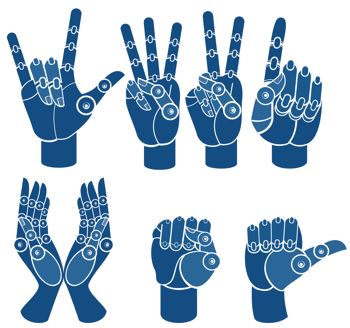A magazine where the digital world meets the real world.
On the web
- Home
- Browse by date
- Browse by topic
- Enter the maze
- Follow our blog
- Follow us on Twitter
- Resources for teachers
- Subscribe
In print
What is cs4fn?
- About us
- Contact us
- Partners
- Privacy and cookies
- Copyright and contributions
- Links to other fun sites
- Complete our questionnaire, give us feedback
Search:
Robots teaching sign language

Robots were once science fiction. Now they are gradually edging their way into our lives. Industrial robots have worked on car production lines for a long time; you can buy robots that will vacuum your house from department stores, and there are plenty of toy robots about. Now they are even training to be teachers.
Most children learn their first language by being immersed in it: everyone around them is speaking it and they just absorb it. Apart from those with deaf parents, deaf children don't have that opportunity. Those that do have deaf parents on the other hand learn sign language as a native language just as verbal children learn their first language. That shouldn't be a surprise. After all, as languages go, sign languages are not really any different to verbal languages. They just use hand movements - gestures - rather than sounds to represent words. Ideally though there should be educational materials to help children learn sign language just as there are for English, French and Mandarin. Videos of people signing are often used but it would be better still if children could see the signs being made in 3D as gestures do make use of more than 2 dimensions.
Hatice Kose a researcher at the Istanbul Technical University in Turkey wondered if robots might be able to help. She therefore programmed some child-sized robots to sign. She also invented some games so that children could play with the robots while at the same time learning signs. One game is an imitation game. The robot makes a sign. The child then has to work out what it means and find the card with the picture that that sign represents. When they have they and show it to the robot. Hatice's robots are equipped with cameras and have been programmed to be able to recognize pictures. The robot can therefore check if the child really did understand the sign by checking if is being shown the right picture.
Robots aren't all out to take over the world, nor will they be happy treated as our slaves doing drudge jobs. In the future they will probably be our friends and companions, and quite probably our teachers too.


